Physical Address
304 North Cardinal St.
Dorchester Center, MA 02124
Physical Address
304 North Cardinal St.
Dorchester Center, MA 02124

Panicking about your first camping trip is normal, but these insider secrets will transform your outdoor anxiety into confidence faster than expected.
You’re not alone if the thought of sleeping under the stars makes your palms sweat. That pit in your stomach when you imagine strange nighttime sounds, unpredictable weather, or encountering wildlife isn’t unusual—it’s actually quite common among first-time campers. Your brain’s naturally wired to fear the unknown, and the outdoors can feel intimidatingly unfamiliar. But here’s what most people don’t realize about conquering those camping fears.
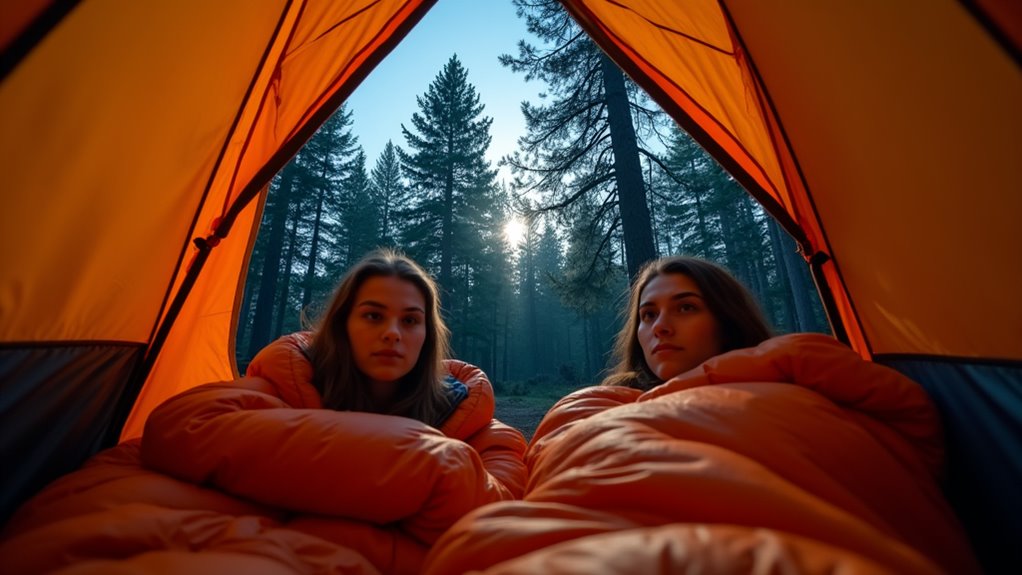
While stepping into the wilderness feels intimidating for many first-time campers, you’re not alone in experiencing what’s commonly called “nature anxiety.” This perfectly normal response stems from our modern disconnect with outdoor environments, unfamiliarity with natural sounds and sensations, and concerns about safety in unfamiliar territory.
Your brain’s wired to perceive unfamiliar environments as potential threats. Urban living conditions you to expect predictable patterns—streetlights, climate control, and immediate access to help. Nature doesn’t offer these comforts, triggering your survival instincts.
Common anxiety triggers include fear of wildlife encounters, getting lost, weather changes, and feeling vulnerable without modern conveniences. You might worry about insects, strange noises at night, or simply not knowing what to expect. Recognizing these fears as natural reactions helps you address them constructively rather than letting them control your outdoor experience.
The good news is that learning essential safety tips can significantly reduce these anxieties and help you feel more confident during your outdoor adventures.
Beyond understanding anxiety’s origins, let’s examine the specific fears that actually prevent people from booking their first camping trip. You’re probably worried about wild animals attacking during the night, getting hopelessly lost without cell service, or facing a medical emergency miles from help.
Wild animal attacks, getting lost without cell service, and medical emergencies miles from help dominate first-time campers’ biggest nightmares.
Weather concerns rank high too – you’re imagining torrential downpours flooding your tent or severe storms with nowhere to shelter.
Many first-timers fear they’ll forget essential gear, leaving them cold, hungry, or uncomfortable. You might worry about bathroom situations, sleeping poorly on hard ground, or simply not knowing basic outdoor skills like starting fires or setting up camp properly.
These fears feel overwhelming, but they’re completely normal and manageable with proper preparation and realistic expectations. Following essential tips can help transform these anxieties into confidence for your outdoor adventure.
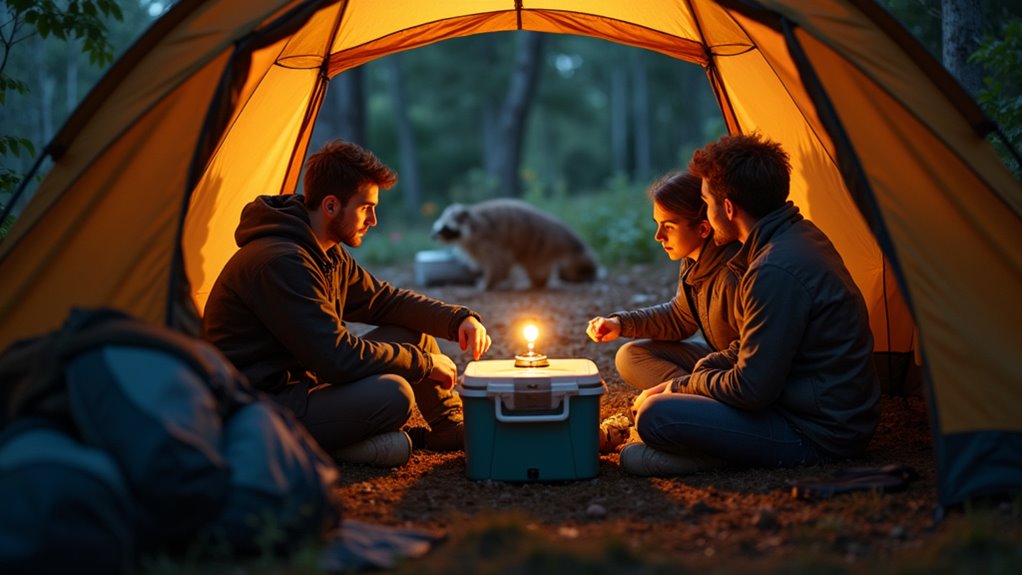
How often do bears actually attack campers versus how often you imagine they do? The numbers might surprise you. Bear attacks happen to fewer than one in two million campers annually. You’re statistically more likely to get struck by lightning twice.
Most wildlife actively avoids humans. Bears, mountain lions, and wolves typically retreat when they detect your presence. The key is proper food storage and making noise while hiking. Store food in bear canisters or hang it properly. Never leave scented items in your tent.
Snakes pose minimal risk if you watch where you step and use a flashlight at night. Most bites occur when people try handling them. Respect wildlife’s space, and they’ll respect yours. Your imagination creates far scarier scenarios than reality delivers.
Following essential safety tips can further reduce your already minimal risk of wildlife encounters while camping and hiking.
Getting lost ranks as another top fear for first-time campers, but modern technology and basic preparation make it largely preventable. Your smartphone’s GPS works even without cell service when you’ve downloaded offline maps beforehand. Pack a backup compass and paper map of your area – they’re lightweight insurance policies that never run out of battery.
Before heading out, tell someone your planned route and return time. Start with well-marked trails near your campsite rather than ambitious backcountry adventures.
If you do lose your bearings, stop immediately. Don’t panic or keep wandering. Use the “STOP” method: Sit, Think, Observe, Plan. Look for landmarks you recognize, retrace your steps if possible, or stay put and signal for help. Most “lost” campers are found within hours.
Once you’re safely back at camp, boost morale with some engaging campfire games that help everyone bond and shake off the day’s stress.
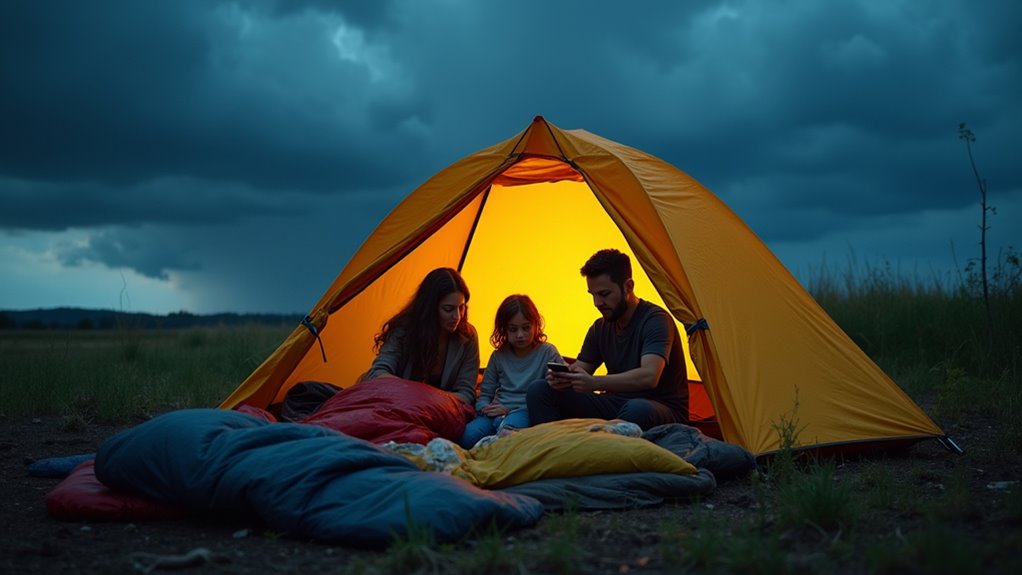
While checking the weather forecast might seem obvious, many first-time campers underestimate how quickly conditions can change outdoors and how different weather feels when you’re sleeping in a tent.
That gentle breeze at home becomes a tent-rattling wind at 2 AM, and light rain can make everything soggy and miserable.
What feels like a pleasant evening breeze can transform into a relentless tent-shaking force once darkness falls.
You’ll want to pack layers for temperature swings and waterproof gear even if rain isn’t predicted. Bring a tarp for extra protection and always tell someone your camping location and return date.
Download offline weather apps since cell service is often spotty.
Most importantly, don’t let weather anxiety keep you home. Start with fair-weather camping trips and gradually build confidence.
Bad weather makes for great campfire stories later. For newcomers to the outdoors, following essential camping tips can make the difference between a memorable adventure and a miserable experience.
Beyond weather challenges, you’ll face another adjustment that catches many first-time campers off guard: suddenly losing access to the conveniences that define modern life. Your phone might lose signal, leaving you without constant entertainment or instant answers. You can’t flip a switch for light or turn a handle for running water.
This disconnection feels uncomfortable initially, but it’s actually liberating. You’ll rediscover simple pleasures like watching stars without light pollution or having uninterrupted conversations around a campfire.
Start small by designating tech-free hours at home before your trip. Pack battery packs for emergencies, but resist using devices for entertainment. Bring books, cards, or journals instead.
For single mothers venturing into camping, this digital detox can provide a unique opportunity to bond with children without the usual distractions of screens and notifications.
You’ll be surprised how quickly you adapt and appreciate the mental clarity that comes from unplugging.
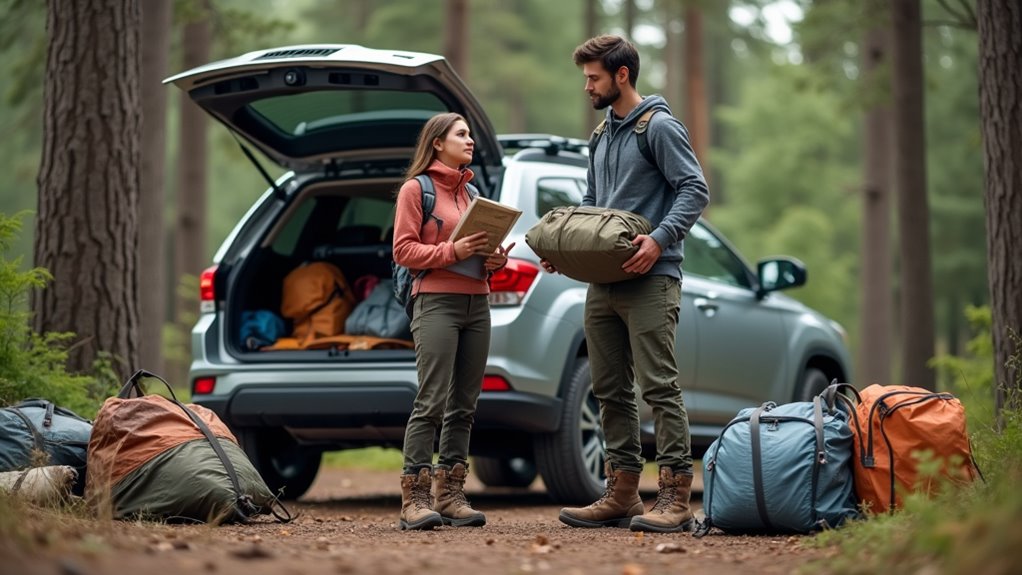
Since camping anxiety often stems from fear of the unknown, thorough preparation becomes your best ally for building confidence. Start by researching your chosen campground extensively—read reviews, study maps, and understand available facilities.
Create detailed packing checklists broken down by categories: shelter, cooking, clothing, and safety gear. Practice setting up your tent at home multiple times until it becomes second nature.
Test all equipment beforehand to avoid unpleasant surprises. Plan your meals completely, prep ingredients at home, and pack extra snacks. Research local weather patterns and pack accordingly.
Download offline maps to your phone as backup navigation. Connect with experienced campers for advice and reassurance.
Most importantly, choose an established campground for your first trip rather than remote wilderness camping. Following these essential camping tips will help transform your nervous energy into excited anticipation for your outdoor adventure. Familiarity breeds confidence.
When you’re selecting your first campground, think of it as choosing a gentle introduction to outdoor living rather than diving into the deep end. Look for established campgrounds with amenities like restrooms, showers, and potable water. These creature comforts will ease your passage from home to nature.
Start with campgrounds that offer restrooms, showers, and water—these amenities create a comfortable bridge between home and wilderness.
State parks often provide the perfect middle ground—they’re maintained, safe, and offer structured environments without being overly commercialized.
Private campgrounds typically feature more amenities but can feel less authentic.
Consider proximity to your home for your first trip. You’ll feel more confident knowing civilization isn’t far away.
Check reviews online and call ahead to ask questions about facilities, cell service, and beginner-friendliness. Staff recommendations can guide you toward the most suitable campsites for newcomers.
Remember that family camping creates lasting memories and bonding experiences that will encourage you to continue exploring the outdoors together.
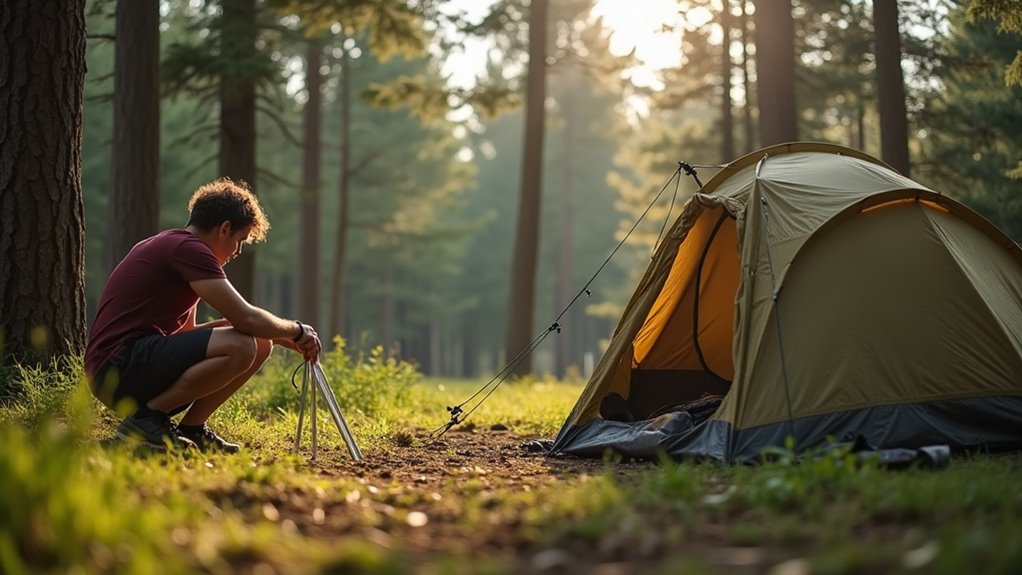
Once you’ve selected your ideal beginner-friendly campground, your journey toward outdoor confidence begins with smart pacing. Don’t attempt everything at once. Start with car camping before considering backcountry adventures. Practice setting up your tent at home first, so you’re not fumbling with unfamiliar gear in fading daylight.
Begin with one-night trips to test your comfort level and equipment. Gradually extend to weekend stays as you gain experience. Choose mild weather conditions for your initial outings – save challenging seasons for later adventures.
Master basic skills progressively: fire building, camp cooking, and proper food storage. Each successful experience builds confidence for the next challenge. Remember, even seasoned campers started somewhere. You’re not racing anyone; you’re developing a lifelong appreciation for the outdoors at your own comfortable pace.
As your camping experience grows, those initial worries about wildlife encounters, getting lost, or equipment failures can actually become your greatest teachers. Each fear you face transforms into practical knowledge that builds your outdoor competence.
That anxiety about bears? It’ll teach you proper food storage and campsite awareness. Your concern about navigation develops into map-reading skills and trail recognition. Equipment worries become maintenance expertise and backup planning abilities.
Here’s how fear becomes adventure fuel:
You’re not just overcoming fears—you’re developing the skills that separate experienced adventurers from nervous beginners. Following proven family camping tips will accelerate this transformation from anxious beginner to confident outdoor enthusiast.
You’ve got all the tools now to transform those butterflies in your stomach into wings of adventure. The wilderness isn’t your enemy—it’s your teacher, waiting to share its lessons with patient hands. Start small, pack smart, and trust yourself. Each crackling campfire you’ll build erases another worry from your list. Soon, you’ll wonder why you ever feared what’s become your sanctuary. The great outdoors isn’t so intimidating after all, is it?